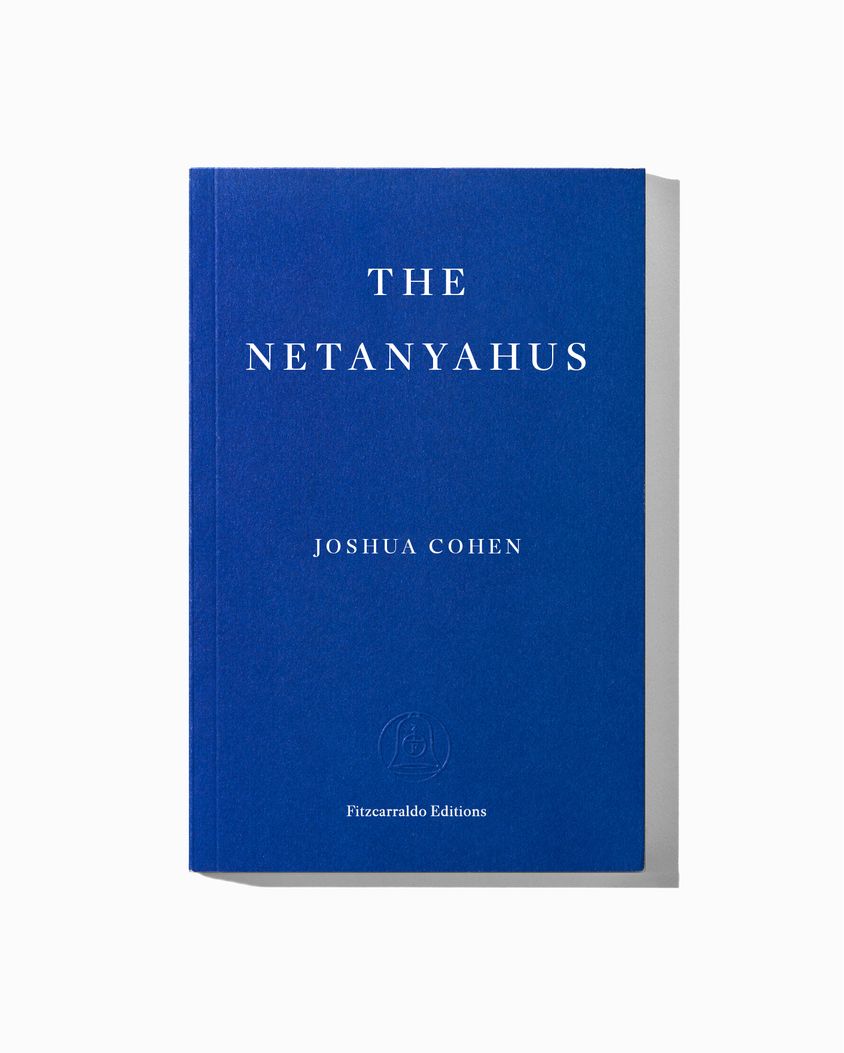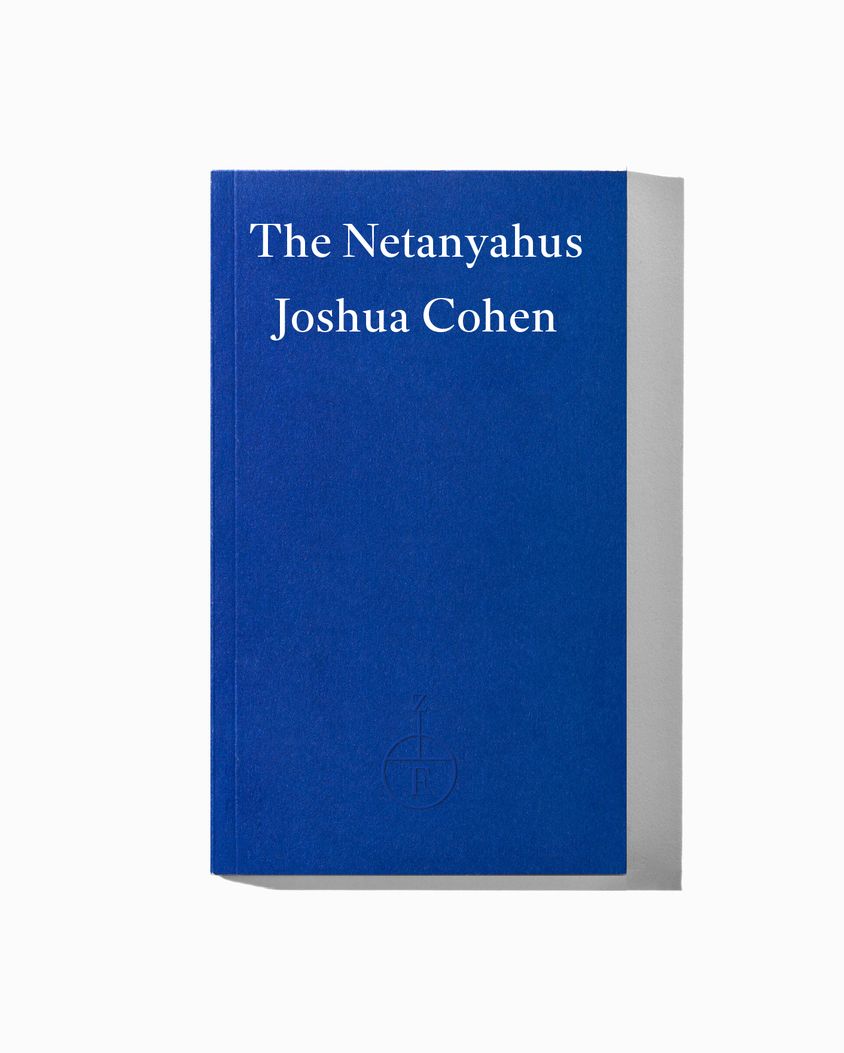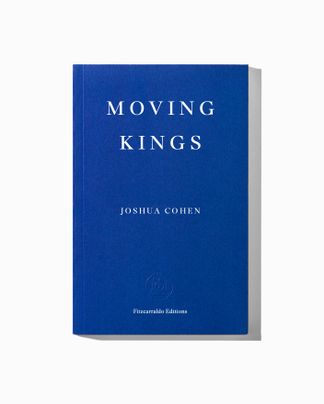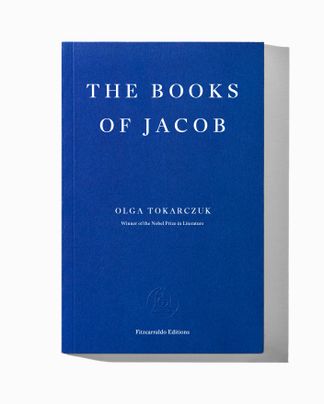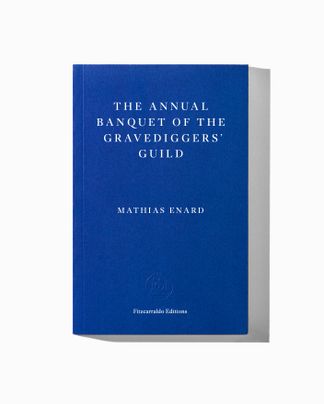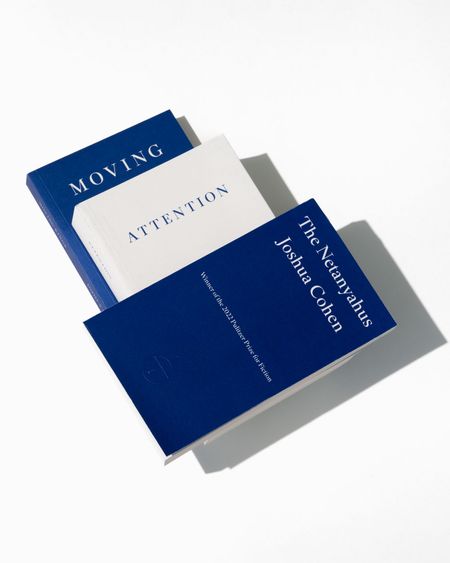Corbin College, not-quite-upstate New York, winter 1959–1960: Ruben Blum, a Jewish historian – but not an historian of the Jews – is co-opted onto a hiring committee to review the application of an exiled Israeli scholar specializing in the Spanish Inquisition. When Benzion Netanyahu shows up for an interview, family unexpectedly in tow, Blum plays the reluctant host, to guests who proceed to lay waste to his American complacencies. Mixing fiction with non-fiction, the campus novel with the lecture, The Netanyahus is a wildly inventive, genre-bending comedy of blending, identity, and politics – ‘An Account of A Minor and Ultimately Even Negligible Episode in the History of a Very Famous Family’ that finds Joshua Cohen at the height of his powers.
The Netanyahus
Published 5 May 2021 | French paperback with flaps, 248 pages | Paperback, 248 pages
Winner of the 2022 Pulitzer Prize for Fiction | Winner of the 2021 Jewish Book Award | Shortlisted for the 2021 National Book Critics Circle Award
The Netanyahus
I.
My name is Ruben Blum and I’m an, yes, an historian. Soon enough, though, I guess I’ll be historical. By which I mean I’ll die and become history myself, in a rare type of transformation traditionally reserved for the purer scholars. Lawyers die and don’t become the law, doctors die and don’t turn into medicine, but biology and chemistry professors pass away and decompose into biology and chemistry, they mineralize into geology, they disperse into their science, just as surely as mathematicians become statistics. The same process holds true for us historians—in my experience, we’re the only ones in the humanities for whom this holds true—the only ones who become what we study; we age, we yellow, we go wrinkled and brittle along with our materials until our lives subside into the past, to become the very substance of time. Or maybe that’s just the Jew in me talking… Goys believe in the Word becoming Flesh, but Jews believe in the Flesh becoming Word, a more natural, rational incarnation…
By way of further introduction, I will now quote a remark made to me by the who-shall-remain-nameless then-president of the American Historical Association, when I met him at a symposium back in my student days just after the Second World War: “Ah,” he said, limply pressing my hand, “Blum, did you say? A Jewish historian?”
Though the man surely intended this remark to wound me, it merely succeeded in bringing delight, and even now I find I can smile at the description. I appreciate its accidental imprecision, and the way the double entendre can function as a type of psychological test:
“‘A Jewish historian’—when you hear that, what do you think? What image springs to mind?” The point is, the epithet as applied is both correct and incorrect. I am a Jewish historian, but I am not an historian of the Jews—or I’ve never been one, professionally.
Instead, I’m an American historian—or I was. After half a century in the professorate, I was recently retired from my post as the Andrew William Mellon Memorial Professor of American Economic History at Corbin University in Corbindale, New York, in the occasionally rural, occasionally wild heart of Chautauqua County, just inland from Lake Erie among the apple orchards and apiaries and dairies—or, as dismissive, geographically-illiterate New York City-folk insist on calling it, “Upstate.” (I myself was once one of these city-folk and though that old wisdom is false that teachers learn more from their students than vice-versa, I did manage to pick this up, early on: never call Corbindale “Upstate.”) Though my initial focus was on the economics of the pre-American, British Colonial period, my reputation, such as it is, was made in the field of what’s now referred to as Taxation Studies, and, especially, from my research into the history of tax policy’s influence on politics and political revolutions. To be sure, I never much enjoyed the field, but it was open to me. Rather, the field didn’t exist until I discovered it, and, like a bumbling Columbus, I only discovered it because it was there. By the time I got into academia, America was already crowded, even American Economic History was already crowded, and I’ve always had a decent head for numbers. Taking on the history of taxes got me out of the ghetto of Colonial catallactics and eventually even out of America itself, into the European city-states, feudal tax-farming, Church tithes, Antiquity’s development of customs duties and trade-tariffs…all the way back to the Rosetta Stone and even the Bible, both of which—most people forget—are substantially just tax-documents…
What else is salient? I wish I knew. But do we ever know? I used to open certain of my classes by paraphrasing Twain, who himself was paraphrasing Franklin, who for his part was presumably plagiarizing Britons untold: “…nothing can be said to be certain in this world, except death and taxes and the due dates of your papers…”
(…)
Wall Street Journal 10 Best Books of 2021 | Kirkus Best Fiction of 2021 | New York Times 100 Notable Books of 2021 | The Times Best Fiction of 2021 | New Statesman Best Books of 2021 | AV Club Best Books of 2021 | The White Review Books of the Year 2021
‘Joshua Cohen is such an accomplished writer it’s surprising he isn’t a better known one…. Cohen’s new book – his sixth – continues the turn to allegorical realism [and] is among his best: a fastidious and very funny book that is one of the most purely pleasurable works of fiction I’ve read in ages.’
— Jon Day, Financial Times
‘The Netanyahus is Cohen’s sixth novel, his most conventional and his best to date. It is a tour de force: compact, laugh-out-loud funny, the best new novel I’ve read this year [and] probably the funniest novel ever written about contending historiographies…. [I]t’s the Netanyahus themselves that are unexpected. Arriving late in the book – having been pre-announced by brilliantly ventriloquised letters of scholarly recommendation – they pile out of the car, tramp snow all over the house and puncture the sensibilities of their hosts. Within four pages of their arrival, the reader has seen the future prime minister of Israel lean over and (maliciously) flick his younger brother’s willy…. When events take a late, serious turn, Cohen never deviates from the comic mode, deliberately leaving the reader questioning whether they should be finding this funny. Cohen’s lesson, in this determinedly comic novel, is that history happens as farce and tragedy simultaneously.’
— John Phipps, The Times
‘[Cohen] clearly is a genius … The Netanyahus [is] a comic historical fantasia – a dizzying range of bookish learning and worldly knowhow is given rich, resourceful expression…. With its tight time frame, loopy narrator, portrait of Jewish-American life against a semi-rural backdrop, and moments of cruel academic satire, The Netanyahus reads like an attempt, as delightful as it sounds, to cross-breed Roth’s The Ghost Writer and Nabokov’s Pale Fire…. This is a brisk, impudent, utterly immersive novel.’
— Leo Robson, Guardian
‘The Netanyahus, like Cohen’s previous novels, is driven by the momentum of its prose. It has a freewheeling, all-consuming style which frequently turns up unexpected delights…. This is a surprising novel, full of quirks and explosive moments.’
— Christopher Shrimpton, Spectator
‘The Netanyahus is a generational campus novel, an unyielding academic lecture, a rigorous meditation on Jewish identity, an exhaustive meditation on Jewish-American identity, a polemic on Zionism, a history lesson. It is an infuriating, frustrating, pretentious piece of work – and also absorbing, delightful, hilarious, breathtaking and the best and most relevant novel I’ve read in what feels like forever.’
— Taffy Brodesser-Akner, New York Times
‘It’s a delightful mix – part campus novel, part history of Zionism – crackling with humour, intelligence and moments when the dark history of the Jews explodes into the story…. Cohen’s description of the 1905 pogrom in Kiev, the back-story about Benzion Netanyahu, the petty humiliations of Ruben Blum, the fight between his daughter Judy and her grandfather about the meaning of “fairness”, all this is as good as anything Cohen has written. Clever, funny, dark, deeply moving, full of references to everyone from Nabokov and the Marx Brothers to Jabotinsky and the late Harold Bloom, The Netanyahus is a joy to read.’
— David Herman, Jewish Chronicle
‘The Netanyahus, in other words, is a campus novel that is also a novel of ideas – a conjunction less common than one might expect. Luckily it’s also very, very funny.’
— Len Gutkin, Chronicle of Higher Education
‘Joshua Cohen’s novel, The Netanyahus is a clever, funny story about Jewish history, the world of academia, the meaning of the Diaspora and losing one’s Jewish soul.’
— Aaron Howard, Jewish Herald-Voice
‘Cohen’s style – inventive but elegantly understated – is a class act that few of his contemporaries can follow. All in all, this is a veritable triumph.’
— Andrew Gallix, The Irish Times
‘Riffing freely on a true story, this brilliant and hilarious new book takes a cozily familiar form, the campus novel, and turns it into a slyly oblique fable about history, identity and the conflicted heart of Jewishness, especially in America.’
— John Powers, NPR
‘Joshua Cohen’s sixth novel is a satirical coup de maître that smuggles serious questions about American exceptionalism, the chaotic and controversial origins of the state of Israel, and the sanity of the family of its recently deposed prime minister, into the form of a campus farce. The Netanyahus … is an achingly funny novel, and all the more so for that fact that it includes chapter-long historiographical lectures and a constant smokescreen of counterfactual and metafictional games…. Written with Cohen’s customary chutzpah, intelligence and wit, The Netanyahus takes the reader on a dizzying journey.’
— Jude Cook, TLS
‘Joshua Cohen has long been lauded for his brilliance with language, but in this short novel he harnesses that verbal dexterity to a taut, thrillingly told story in which the trappings of a midcentury suburban setting disguise a sharp and topical political inquiry. Drawing on – and subverting – both the campus satire and the traditional Jewish-American novel, Mr. Cohen fashions an ingenious and witty parable about the ambiguities of Zionism.’
— Wall Street Journal
‘The Netanyahus is … a remarkably daring work of fiction…. Despite its levity, The Netanyahus is a novel full of such sentences, sentences heavy with meaning that transcends the text. Even single words – “America”, “Israel”, “diaspora”, “tradition” – when spoken by Cohen’s Netanyahu, have a spectral weight to them. The weight of history. The weight of a people.’
— Tadg Hoey, Dublin Review of Books
‘Cohen has performed a literary miracle of sorts, transforming the shadowy, dour figure of Benzion Netanyahu into the protagonist of an uproariously funny book. In its skewering of the small-mindedness of academic culture, The Netanyahus conjures up the hilarity of David Lodge, and in its piercing gaze and over-the-top, transgressive moves, it evokes the late Philip Roth, who ripped open the soul of the American Jewish parvenu – and that figure’s grinding quest for respectability – like no one else.’
— David N. Myers, Los Angeles Review of Books
‘Joshua Cohen’s The Netanyahus is the funniest, smartest, most exhilarating read of the year.’
— Corey Robin, Jacobin Magazine
‘The Netanyahus is an unapologetically brilliant performance from one of our best living writers. Cohen’s swaggering, virtuosic prose sets him apart from his peers. His is the rare contemporary book where the ideas and the prose equal each other in their intensity and intelligence.’
— Stephen Altobelli, Emory Wheel
‘No one writing in English today is more gifted than Joshua Cohen. Every page of The Netanyahus – an historical account of a man left out of history, a wickedly funny fable of the return of the repressed – crackles with Cohen’s high style and joyride intelligence.’
— Nicole Krauss, author of Forest Dark
‘The Netanyahus is constructed with a brilliant comic grace that moves from the sly to the exuberant. Some scenes are funny beyond belief. But even when moments in the book are sharp or melancholy, they keep an undertone of witty and ironic observation. The vision in this book is deeply original, making clear what a superb writer Joshua Cohen is.’
— Colm Tóibín, author of The Magician
Joshua Cohen was born in 1980 in Atlantic City. His books include the novels Moving Kings, Book of Numbers, Witz, A Heaven of Others, and Cadenza for the Schneidermann Violin Concerto; the short fiction collection Four New Messages, and the non-fiction collection Attention: Dispatches from a Land of Distraction. Called ‘a major American writer’ by the New York Times, ‘maybe America’s greatest living writer’ by the Washington Post, and ‘an extraordinary prose stylist, surely one of the most prodigious at work in American fiction today’ by the New Yorker, Cohen was awarded Israel’s 2013 Matanel Prize for Jewish Writers, and in 2017 was named one of Granta’s Best Young American Novelists. In 2022, he was awarded the Pulitzer Prize for Fiction for The Netanyahus. He lives in New York City.

